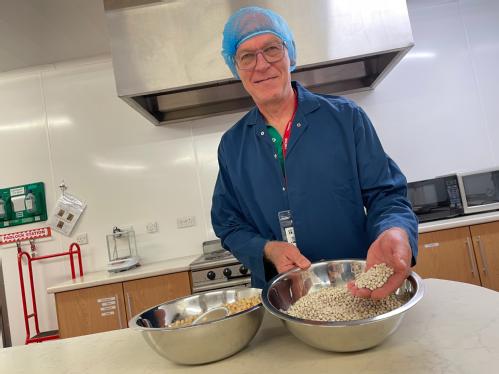Press Releases
British grown baked beans ‘in the can’ thanks to University of Warwick Scientist
The University of Warwick’s British grown baked beans have progressed to the tinning phase, a pivotal step in their journey orchestrated by Warwick’s Professor Eric Holub.
Grown using innovative agricultural methods developed by Warwick Crop Centre at the University of Warwick's Innovation Campus, Stratford-upon-Avon, Capulet Beans have now entered the tinning process, showing a commitment to fostering locally sourced, high-quality produce.
Professor Holub, collaborating closely with Lincolnshire farmer Andy Ward, said, "We went to the Princes factory to see how well the Capulet beans ‘can’ and they’ve done a marvellous job”.
Farmer, Andy Ward, added “It’s absolutely fantastic to be the farmer that’s grown these beans. To see them go through the line and into a tin – soon to be on a piece of toast, is unreal”.
Capulet Beans, now progressing towards tinning, represent a significant step towards sustainable, UK-sourced food options, in line with the University of Warwick's mission to spearhead agricultural advancements and tackle global food security challenges.
Capulet beans are the first bean that can be used as baked beans to be grown in the UK. Previously, baked beans have had to be imported from as far as South America.
After 12 years of work, Professor Eric Holub was there to witness the tinning of the Capulet beans, now grown on a commercial scale at a farm in Lincolnshire.
Professor Eric Holub said: “Self-sufficiency in food production is important for reducing human impact on global climate. British-grown beans can help us shift our diets to a healthier future, adding to UK ingredients, and supplying the growing trend of flexitarian diets, with new markets such as Brit-Mediterranean and Brex-Mexican style food.”
Growing haricot beans on a commercial scale in the UK would reduce food miles, contribute to achieving climate goals in the food sector, improve soil structure, and help extend farm rotations by offering a short-season, nitrogen-fixing crop (extracting it from the air and turning it into a usable form for growth) desired by UK growers.
